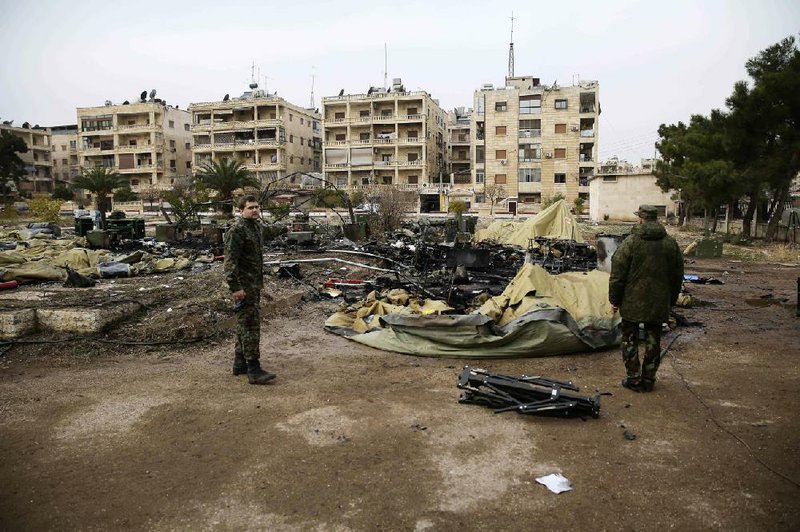Rebels in the Syrian city of Aleppo on Monday rejected calls to withdraw from their shattered enclave, despite government advances through what was once an opposition stronghold.
The offensive has boxed the rebels into a small patch of territory, killing hundreds of civilians and shattering the area's remaining infrastructure.
Russia, a key ally of Syrian President Bashar Assad, said Monday that it was preparing to begin talks with the United States about a rebel withdrawal from the city.
Russian Foreign Minister Sergey Lavrov said talks would be held with the United States this week in Geneva on a rebel withdrawal from eastern Aleppo, Russian news agencies reported. The Russians have tried before to coax rebels into leaving the territory, setting up corridors out of the district, but the fighters have refused because they want to retain their control over parts of the city. Some fear that the Russians and their Syrian allies would not ensure their safety.
Yasser al-Youssef, a spokesman for the hard-line Islamist Nour al-Din al-Ziniki faction, insisted that a withdrawal was "unacceptable." Another rebel representative, Abu Abdel Rahman Al-Hamawi of the Jaish al-Islam group, said his forces would continue "until the last drop of blood."
Lavrov said he was confident that an agreement on a rebel withdrawal would be reached with the United States during talks to be held in Geneva starting today or Wednesday.
He said Secretary of State John Kerry had submitted a proposal for the routes and timing of the fighters' departure after meeting with Lavrov in Rome on Saturday.
U.S. officials acknowledged the possibility of talks with the Russians in Geneva this week but would not confirm the substance of Lavrov's remarks.
They also condemned the indiscriminate bombing of eastern Aleppo by Russian-backed Syrian forces and reiterated their calls for a humanitarian pause in the fighting, a step that Russian and Chinese diplomats vetoed Monday at the United Nations.
Mark Toner, a State Department spokesman, said in Washington that there had been discussion of "technical talks taking place this week, but we don't have anything to confirm at this point."
The United States shares Russia's antipathy for militants from Jabhat Fatah al-Sham, the group formerly known as the Nusra Front, who are hiding in eastern Aleppo. But the Americans also support other groups of fighters who oppose Assad.
While the United States agreed that militants in Aleppo were a problem, Toner said, "there's a moderate Syrian opposition that should not and does not deserve to be bombed into submission."
As the tide of Syria's war has turned in Assad's favor, rebel forces -- and sometimes the civilian populations under their control -- have withdrawn from a string of areas across the country.
The Syrian Observatory for Human Rights, a monitoring group, said at least 50,000 civilians fled rebel-held east Aleppo last week as government forces, backed by an array of Iran-funded militias, closed in.
As fierce clashes broke out Monday around Aleppo's Old City, rebels and pro-government forces fought for a hold in districts where tens of thousands of people are trapped. The opposition-run Thiqa News agency and the Syrian Civil Defense said four civilians were killed in the rebel-held Zabadiyeh district when barrel bombs were dropped there.
One man described a stream of dead and injured being carried into a house. The area's hospitals have largely ceased to function after attacks by government and Russian warplanes.
Rebel forces have regularly shelled government-held areas in response. Officials said Monday that two Russian nurses and eight civilians were killed.
The shelling initially killed one female nurse and wounded two Russian medics working in a field hospital, a Russian officer told reporters. He spoke on condition of anonymity in line with regulations. Moscow had sent hospital equipment to the government-controlled Furqan neighborhood on Sunday.
Another nurse who was wounded in the shelling later died, the Russian Defense Ministry said.
At least eight civilians were killed in different neighborhoods, according to the official Syrian Arab News Agency. Among the dead were two children and four women, said the Observatory.
Describing the armed opposition as "animals in human form," Defense Ministry spokesman Igor Konashenkov blamed the rebellion's Western backers.
The Russian Defense Ministry also said an Su-33 fighter jet crashed in the Mediterranean as it returned to the aircraft carrier Admiral Kuznetsov after a sortie over Syria. "Because of the failure of the arrester system's cable, the Su-33 fighter rolled off the deck," the ministry said.
The pilot ejected and was unharmed, the ministry said, adding that Russian military operations over Syria would not be affected by the incident.
This is the second loss of an aircraft from the Admiral Kuznetsov since it arrived off Syria last month. A MiG-29 crashed into the sea Nov. 15 while trying to land on the carrier.
Information for this article was contributed by Louisa Loveluck and David Filipov of The Washington Post; by Albert Aji, Bassem Mroue, Howard Amos, Nataliya Vasilyeva and Sarah El Deeb of The Associated Press; and by Anne Barnard, Somini Sengupta, Gardiner Harris and Rick Gladstone of The New York Times.
A Section on 12/06/2016
